This stylish Dutch erotic thriller and black comedy, starring Jeroen Krabbé, Renée Soutendijk, and Thom Hoffman, is based on a novel by Gerard Reve. The film was a box-office hit in the Netherlands and became the highest-grossing Dutch film of all time in the United States. Like Benedetta, De vierde man/The Fourth Man is frank, sexy and violent, and very interesting. The press photos in this post are vintage. I gathered them when I worked as a freelance film critic during the 1980s.

Dutch press photo. Jeroen Krabbé in De vierde man/The Fourth Man (Paul Verhoeven, 1983).

Dutch press photo. Jeroen Krabbé in De vierde man/The Fourth Man (Paul Verhoeven, 1983).

Dutch press photo. Renée Soutendijk in De vierde man/The Fourth Man (Paul Verhoeven, 1983).

Dutch press photo. Jeroen Krabbé and Renée Soutendijk in De vierde man/The Fourth Man (Paul Verhoeven, 1983).
Finding three film reels with names of men
De vierde man/The Fourth Man follows Gerard (Jeroen Krabbé), a bisexual, alcoholic writer who is invited to give a lecture to the Literary Society of the city of Vlissingen. At the train station, he cruises an attractive young man for sex, but the man embarks on another train.
During his lecture, Gerard is incessantly filmed by a mysterious woman with a handheld camera. Afterward, he is introduced to her. She is Christine Halsslag (Renée Soutendijk), a wealthy widow who owns the Spider beauty shop. The two have sex, after which Gerard has a nightmare in which Christine cuts off his penis with scissors.
In the morning, Christine tells Gerard she is a widow, having lost her husband Johan in an accident. Later, in Christine's salon, Gerard finds a photograph of her attractive German lover, Herman (Thom Hoffman), and realizes he is the same man he encountered in the train station. He urges her to bring Herman to her house to spend a couple of days together, but with the secret intention of seducing the man.
Christine travels to Köln to bring her boyfriend and Gerard stays alone in her house. He drinks whiskey and snoops through her safe, finding three film reels with names of men; he decides to watch the footage and discovers that Christine had married each; all of whom died in tragic accidents.
While he attempts to pursue Herman, Gerard is plagued by a series of disturbing visions suggesting the mysterious Christine may be a Black Widow who has chosen him as her fourth victim.

Dutch photo: Jeroen Krabbé and Renee Soutendijk in De Vierde Man/The Fourth man (Paul Verhoeven, 1983).

Dutch press photo. Renée Soutendijk in De vierde man/The Fourth Man (Paul Verhoeven, 1983).

Dutch press photo. Jeroen Krabbé and Renée Soutendijk in De vierde man/The Fourth Man (Paul Verhoeven, 1983).
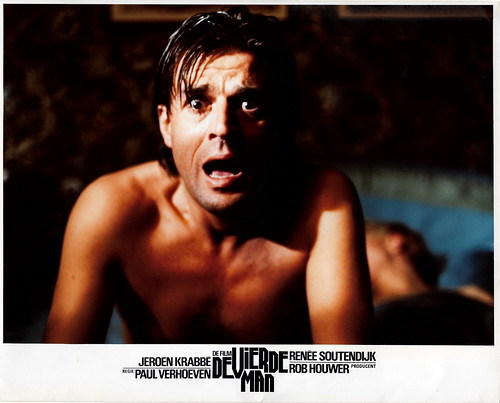
Dutch photo: Jeroen Krabbé in De Vierde Man/The Fourth man (Paul Verhoeven, 1983).
Pulled into Soutendijk's web, like an unsuspecting fly
Robert Firsching writes at AllMovie that De vierde man/The Fourth Man: "gained a cult following for its frank treatment of bisexuality, bizarre visuals, and an extremely sexy performance by Renee Soutendijk as a woman who may or may not have killed her three previous husbands. Jeroen Krabbe is terrific as the intended fourth, a broken-down bisexual writer who is pulled into Soutendijk's web, like an unsuspecting fly.
Bloody and erotic, De Vierde Man will also interest fans of director Paul Verhoeven, who returned to many of the same themes in his smash American hit Basic Instinct."
De vierde man was a box office hit in the Netherlands, gaining 274,699 admissions, but lower than the millions of visitors Verhoeven's previous films had. The film was more successful in the United States, where it received widespread critical acclaim and was the highest-grossing Dutch film of all time with a gross of $1.7 million. The Fourth Man earned the 1983 International Critics' Award at the Toronto International Film Festival and was nominated for the 1983 Gold Hugo for Best Feature Award at the Chicago International Film Festival
At Roger Ebert.com, Peter Sobczynski writes that De vierde man is one of "Verhoeven’s most interesting films. (...) For more than 45 years, director Paul Verhoeven has been shocking and entertaining audiences, both in his homeland of the Netherlands and in Hollywood, with a series of heady cinematic cocktails that mix explicit violence and sexuality, cutting narratives, plenty of social commentary and levels of moral ambiguity rarely seen in contemporary commercial cinema.
Needless to say, his jabs at cinematic propriety have not always found favor with critics and audiences at the time they were released. But to look at them today, divorced from all the controversies that often surrounded them during their initial distributions, one can finally appreciate him as one of the most audacious filmmakers of our time—one of the few whose works could comfortably play in both the toniest of art houses and the sleaziest of grind houses and seem perfectly at home in either one."
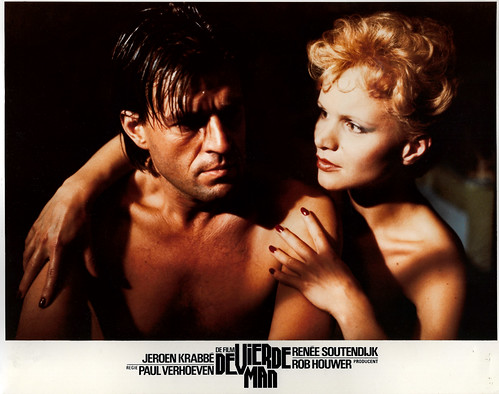
Dutch press photo. Jeroen Krabbé and Renée Soutendijk in De vierde man/The Fourth Man (Paul Verhoeven, 1983).
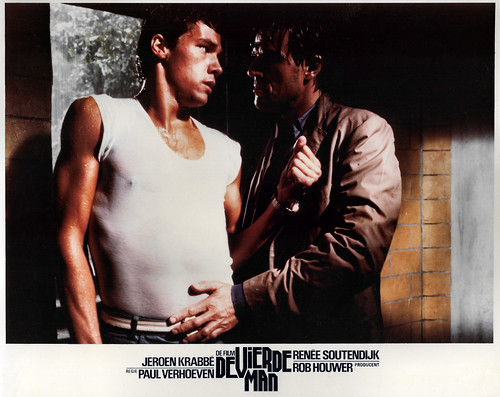
Dutch press photo. Jeroen Krabbé and Thom Hoffman in De vierde man/The Fourth Man (Paul Verhoeven, 1983).
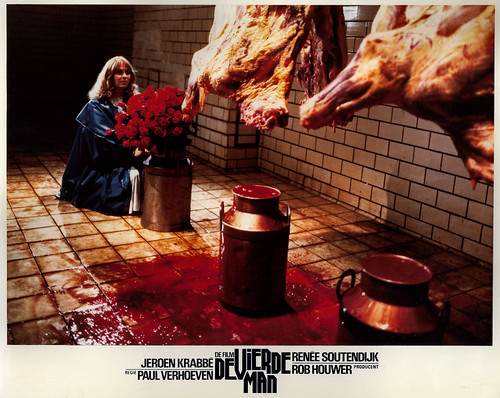
Dutch press photo. Geert de Jong in De vierde man/The Fourth Man (Paul Verhoeven, 1983).

Dutch press photo. Thom Hoffman in De vierde man/The Fourth Man (Paul Verhoeven, 1983).
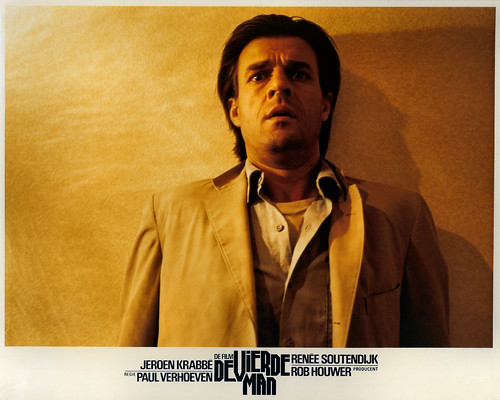
Dutch press photo. Jeroen Krabbé in De vierde man/The Fourth Man (Paul Verhoeven, 1983).
Sources: Peter Sobczynski (Roger Ebert.com), Robert Firsching (AllMovie), Wikipedia, and IMDb.
No comments:
Post a Comment